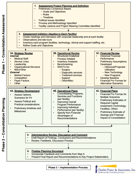With the ongoing interest in
physician and hospital alignment and integration strategies, this December 11, 2009 poll from the American College of Cardiology (ACC) is most interesting. Credit is given to our colleague, Walter Unger of Unger and Associates, for bringing this poll to our attention.
The poll was conducted by Jim Fasules, M.D., FACC, ACC's Senior VP of Advocacy, and reported by ACC CEO Jack Lewin, M.D. Participants in the poll were asked, "Did your practice integrate with a hospital in 2009?" Here are the responses:
• 13% said yes, my practice integrated in 2009.
• 23% said no, but my practice has concrete plans to integrate.
• 50% said no, but my practice is thinking about it in the next 1-2 years.
• 15% said no, my practice has no plans to integrate with a hospital.
These results show just how strong the trend towards integration really is. A total of 36% of practices have integrated or have "concrete plans" to integrate. Another 50% of the respondents state that they are thinking about it. While the respondents are (presumably) only cardiologists, and the poll was not inclusive of other cardiovascular physicians (particularly cardiac surgeons) who may entertain the idea of integration, the poll is still a powerful indication of just how strong the integration movement is.
CFA is involved with clients where the circumstances leading up to interest on the part of cardiovascular physicians in integrating vary considerably. One would think the predominate reason for cardiologists and cardiac surgeons, among others, to consider alignment with local hospitals is purely economic. The initial stimulus frequently is; however, other factors come into play. It is logical to assume that physicians who have not been financially successful would be the first to consider an integration strategy. But this is not necessarily so. Consider the following:
Recently, in the southeast, a group of cardiovascular surgeons affiliated with the largest volume and most prestigious cardiovascular program in their state expressed interest in integration with their affiliated hospital. By every comparative metric applied, they were a highly financially successful group of surgeons with a significant geographic monopoly based on strong referral patterns. While their overall cardiac surgical volume had trended down, their group and individual incomes were stable as they aggressively managed their practice expenses and diversified into vascular surgery to maintain case volume and revenue. This group went to the extensive measure of taking one of their surgeons out of active practice and sending him for retraining in state of the art vascular procedures to build practice volume. Yet they still believed the overall, long term trends were working against them. The historical financial success of their practice did not preclude them from reconsidering their future direction.
Hospitals need to be prepared for this Physician-hospital alignment and integration movement by proactively thinking about their overall strategy and tactics before the issue arises. One of our senior staff attended a seminar on alignment this past year where a hospital administrator from the Midwest said that he lived in dread of any phone call or personal visit from one of his medical staff, because so many of them were asking to be bought out and employed! He was overwhelmed by the issue and knew that he needed to prepare a strategic response to this trend if he was going to keep his head above water.
CFA recommends that all hospitals and physician groups be prepared to deal with the issue of integration. With up to 50% of poll respondents actively considering integration with a hospital, it is imperative that each hospital and physician group understand the economic and political trends that promote alignment and integration, and the implications on their respective businesses.
To view the poll referenced in this posting, please refer to The Lewin Report

